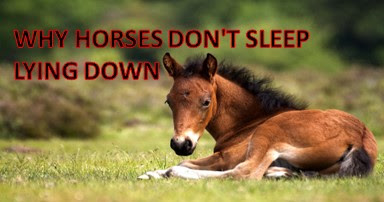The Benefits of Standing Sleep | The Mechanics of Standing Sleep| Equine Social Dynamics
Why Horses Don't Sleep Lying Down: Exploring the Science Behind the Standing Sleep Phenomenon
Horses
are known for their graceful appearance, powerful gallop, and their ability to
sleep standing up. Yes, you read that right! Horses have a unique sleep pattern
that involves them staying on their feet. You might wonder why horses don't
sleep like most animals, lying down in a comfortable position. In this article,
we'll dive deep into the science behind this fascinating phenomenon and explore
some theories about why horses prefer standing up when they sleep.
Table of Contents
1. Understanding Horse Sleep Patterns
2. The Mechanics of Standing Sleep
3. The Benefits of Standing Sleep
4. Theories Behind the Standing Sleep Phenomenon
. Evolutionary Advantage
. Predation Protection
. Equine Social Dynamics
5. Addressing Concerns About Standing Sleep
6. Ensuring Safe Standing Sleep for Horses
7. Conclusion
8. FAQs
1. Understanding Horse Sleep Patterns
Horses,
like most animals, need to sleep to maintain good health and function properly.
However, their sleep pattern is quite unique. Horses require an average of 2.5
to 3 hours of sleep a day, much less than the recommended 7 to 9 hours of sleep
for humans. They have adapted to sleep in short intervals, typically taking a
series of 15-minute naps throughout the day and night. These naps are often
referred to as "microsleeps."
2. The Mechanics of Standing Sleep
When
horses sleep, they enter a light sleep state that allows them to rest and
rejuvenate their bodies without losing complete awareness of their
surroundings. During this state, they maintain their balance by locking their
legs in a straight position using a locking mechanism in their joints. This
mechanism, known as the stay apparatus, allows the horse to remain standing
without exerting any muscular effort.
3. The Benefits of Standing Sleep
The
ability to sleep standing up gives horses an evolutionary advantage. As prey
animals, they need to be alert to potential predators at all times, and
sleeping and standing up allows them to quickly escape danger. Additionally,
standing sleep will enable horses to rest while also being able to quickly graze or
move to a new location if necessary.
4. Theories Behind the Standing Sleep Phenomenon
- Evolutionary Advantage
The
ability to sleep standing up likely developed as a survival mechanism. Horses
that could sleep while standing had an advantage over those that needed to lie
down to rest. They could rest while remaining alert to predators and other
dangers in their environment, and they could quickly escape danger if
necessary.
- Predation Protection
In
addition to being able to quickly escape danger, standing sleep also allows
horses to avoid being trampled by other horses or animals. Horses are social
animals, and sleeping together in a herd can be dangerous if one horse
accidentally rolls over on another while lying down.
- Equine Social Dynamics
Horses
are highly social animals that form strong bonds with their herd mates.
Sleeping standing up allows them to maintain contact with their group and
quickly join in if necessary. It also allows them to take turns sleeping,
ensuring that at least one member of the herd is always alert and on watch.
5. Addressing Concerns About Standing Sleep
Many
people are concerned that standing sleep is harmful to horses and that they
would be more comfortable lying down to sleep. However, research has shown that
horses are perfectly capable of getting the rest they need while standing up.
They can enter a deep sleep state known as REM sleep, during which
their bodies are fully relaxed.
6. Ensuring Safe Standing Sleep for Horses
While
horses are capable of sleeping standing up, it's important to ensure that they
are doing so safely. Horses should have access to a comfortable and stable
surface to stand on, as well as adequate space to move around and stretch their
legs. Additionally, it's important to monitor horses for signs of fatigue or
stress, such as drooping eyelids, swaying, or leaning against objects.
7. Conclusion
In
conclusion, horses' ability to sleep standing up is a fascinating adaptation
that has developed over centuries of evolution. While it might seem strange to
us as humans who require a good night's sleep lying down, horses have found a
way to rest and rejuvenate their bodies while staying alert and aware of their
surroundings. Understanding and respecting this unique sleep pattern is
essential for the proper care and well-being of horses.
8. FAQs
1. Do horses ever lie down to sleep?
While
horses can sleep lying down, they usually only do so for short periods.
2. Is standing sleep terrible for horses?
No, standing
sleep is a natural and healthy behavior for horses, as long as they can
do so safely.
3. How do horses sleep standing up without falling over?
Horses
have a locking mechanism in their joints called the stay apparatus that allows
them to stand without exerting any muscular effort.
4. Can horses enter deep sleep while standing up?
Yes,
horses are capable of entering a deep sleep state known as REM sleep while
standing up.
5. Why do horses sleep standing up?
Horses'
ability to sleep standing up is a survival mechanism that allows them to
quickly escape danger and remain alert to potential threats in their
environment.






Post a Comment